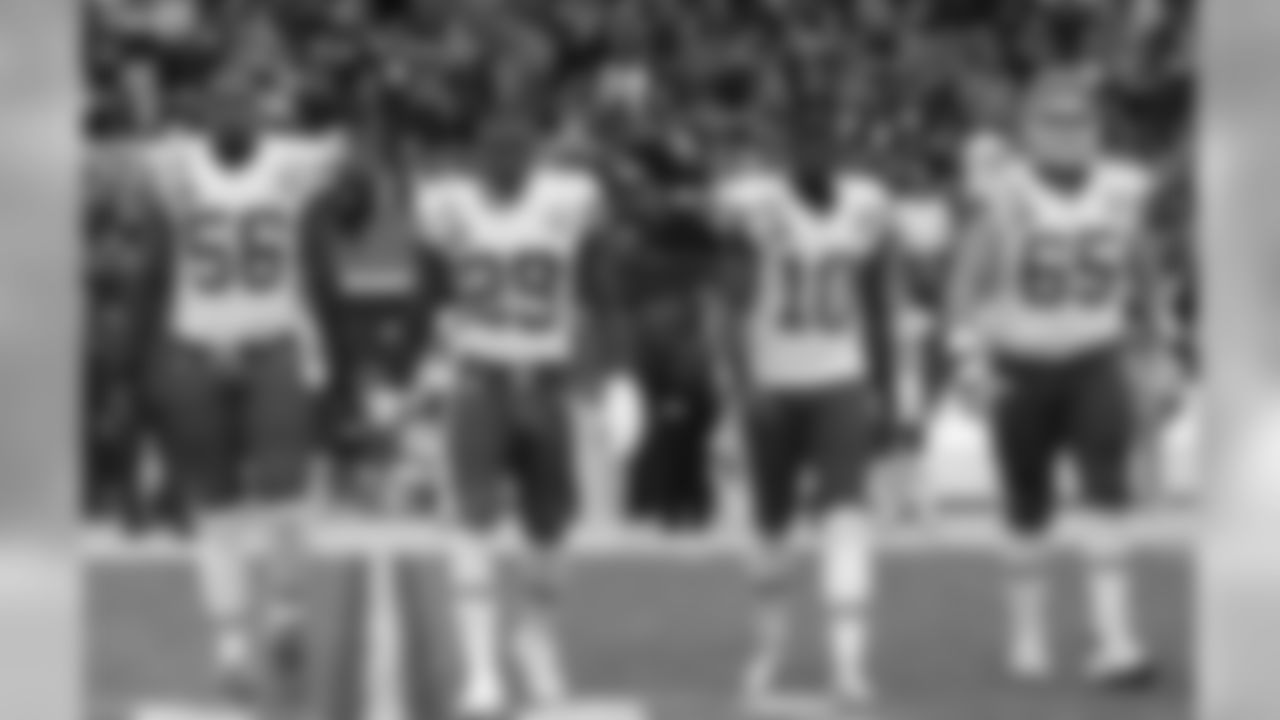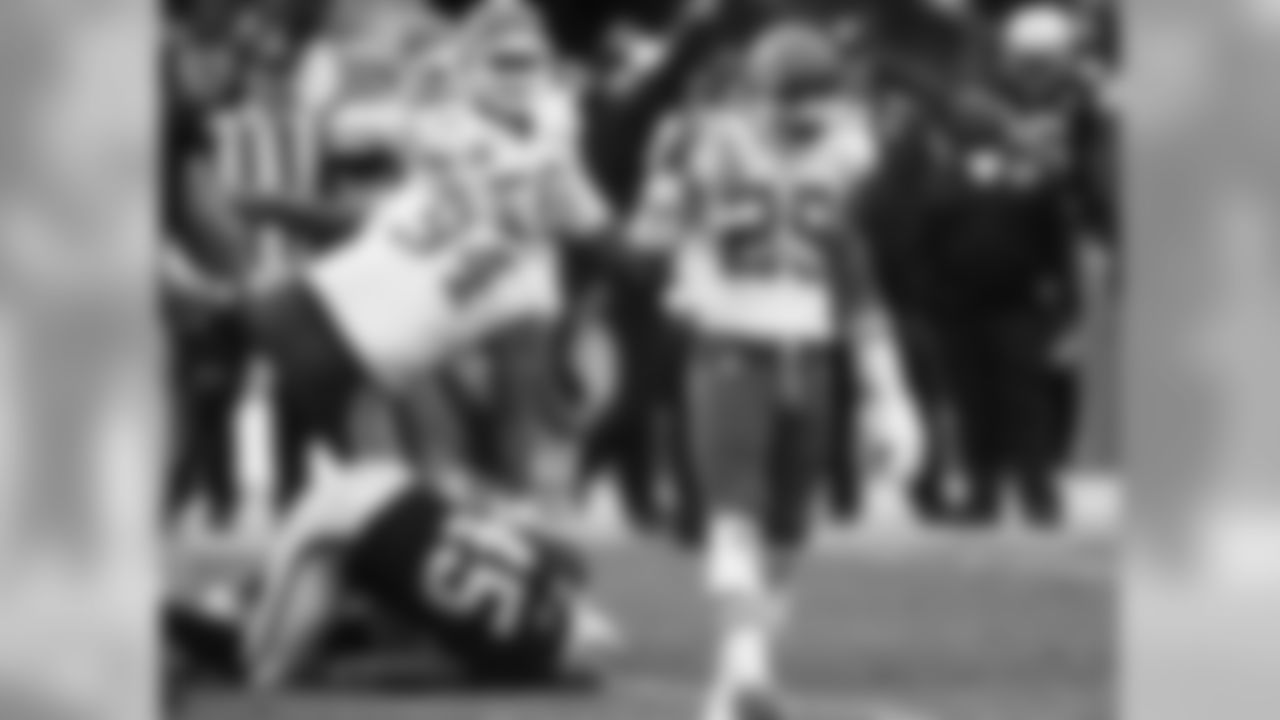"I hit the two, I hit the nine and I salute him."
That's how Kansas City Chiefs safety Eric Berry, the No. 5 overall pick back in the 2010 NFL Draft, salutes his friend and mentor, Inky Johnson, whenever he makes a big play.
Berry was given the opportunity to wear No. 29, which happened to be Johnson's old number at the University of Tennessee, when he arrived in Kansas City.
Berry jumped on the opportunity to honor his friend.
"Immediately, I said 29," Berry recalled of selecting that number. "That's the number. [Inky] said I didn't have to do it, but I felt privileged to be able to have the opportunity to wear that number. Every time I put it on, I represent him."
While they never played together at Tennessee, Berry and Johnson's time together in Knoxville created a bond that would soon help to define them both.

Johnson grew up in Kirkwood, Georgia, a neighborhood just east of Atlanta and lived in his grandparent's house with 13 other family members.
"Kirkwood was a rough neighborhood and [Inky] witnessed everything you see about ghetto life," said J.J. Johnson, Inky's Uncle.
But football was Johnson's life. That was his passion.
Even at 5-foot-9 and 160 pounds, Johnson played bigger than that and rarely came off the field for Alonzo Crim High School.
He played quarterback, running back, cornerback, safety and both returner spots, basically wherever he was needed, but he just wasn't getting the attention of the major Division I programs in Georgia despite putting up great numbers.
"We were at a school where we were pretty much facing the odds," Johnson said. "The dropout rate was higher than the graduation rate. It's the lowest performing public school in the state of Georgia and so college scouts really didn't come into Alonzo Crim High School."
But Johnson said that didn't stop him from dreaming big.
"I grew up like any other kid," Johnson said. "I had dreams and aspirations and big hopes to do some great things. My dream in particular was to be an NFL player. Then I was blessed with a scholarship to the University of Tennessee."

Inky Johnson
Former University of Tennessee coach Phillip Fulmer remembers Johnson as having all the tools needed to be a great defensive back.
"What you're looking for in a cornerback in the Southeastern Conference is they can play man-to-man and be a "shutdown, lockdown" kind of corner. [Johnson] had all those tools regardless of being 160 pounds," Fulmer said.
On the other hand, a couple of years later, Berry's recruitment to Tennessee was filled with a lot more fanfare.
His father, James Berry, had been a running back for the Volunteers (1978-81) and ran for more than 1,700 yards with 18 touchdowns during his career in Knoxville.
Berry was always going to choose Tennessee, his father's alma mater, but he was a five-star recruit out of high school when he arrived on campus, while just a few years prior, Johnson had been just a two-star recruit and had an uphill battle to find his way onto the field.
"I can remember a game [Berry's] senior year where we were playing against Cam Newton," Berry's high school coach at Creekside, Kevin Whitley recalled. "And so, in the paper it was so-called 'Eric Berry versus Cam Newton' and that game was so big, it had to be moved to a Saturday."
Once Berry arrived on campus in 2007, it wouldn't be long before he and Johnson would develop a bond that is still there today.
Despite the two-star rating out of high school, Johnson did enough during preseason workouts to play in 10 games as a true freshman for the Volunteers in 2004.
"I knew my time was coming," Johnson said. "All I had to do was be responsible and seize the moment when it did come. In my mind, I was a starter before I became a starter."
As a sophomore, Johnson earned his way into the starting defensive backfield for the Volunteers.

Johnson's first collegiate start came against Alabama in 2005, where he finished with a career-high seven tackles, one pass breakup and a forced fumble.
He finished his sophomore season with 30 tackles and eight passes defensed, one sack, one forced fumble and 2.5 tackles for loss.
But everything changed early in his junior season in 2006.
After a thrilling win in their season opener against Marshawn Lynch, DeSean Jackson and the Cal Bears, Johnson and the Volunteers went up against Air Force.
Late in the fourth quarter, with Air Force trailing and driving against the Volunteers defense, Johnson made a hit on an Air Force receiver down the field near the sideline.
"It was a routine play," Johnson recalled. "I was 163 pounds and so the way I approached a tackle was simple. It's either me or you and I'm not blinking."
After the hit, Johnson knew something was wrong.
"It seemed as if every breath in my body left and I fell to the ground and I blacked out," Johnson said. "It was one of the scariest moments of my life. The shock eventually left and it stayed in my right arm and hand. I was lying on the field and I looked over at the trainers and the doctors running over to me."
After leaving the field on a stretcher, Johnson was taken to the hospital and soon learned the severity of his injury.
"I had busted a subclavian artery in my chest and I was bleeding internally," Johnson said. "They had to take the main vein out of my left leg, plug it into my chest in order to save my life and that's when they discovered I had nerve damage in my right shoulder."
That nerve damage would lead to Johnson's right arm being paralyzed.
Coach Fulmer remembers being in the hospital that night and waiting for Johnson to wake up.
"My wife Vicki and I were sitting there when he woke up and we go in and see him and the first thing out of his mouth—I say 'Inky how you doing?'
'Coach, I'm blessed.'
"We both sit there and just balled it with each other," Fulmer recalled. "What a show of courage by a young man that had it all going for him and then all of a sudden he's looking at starting over again."
Johnson, who had already overcome so much just to get to Tennessee, had finally earned a starting position and was coming into his own as a playmaker for the Tennessee defense, but then he was dealt a different hand.
His path had changed.
Eventually, that path brought him back to the football field at the University of Tennessee, and he recalled the first time he came back to see his teammates.
"I had tears in my eyes," Johnson said. "Some of those guys had tears in their eyes. I told them, 'Just appreciate the game.' Don't disrespect the game and give it everything you got because you never know when it's going to be your last play.
"It's just like life. We take things for granted until we no longer have them."
Johnson handled the adversity of his situation in a way many people wouldn't.
a few special moments in the career of Eric Berry.

Tennessee's Eric Berry (14) returns a fumble as he gets away from Georgia's Michael Moore (82) and Eric Elliot (30) during the second half of an NCAA college football game in Knoxville, Tenn.

Tennessee's Eric Berry poses with his trophy after winning the Jim Thorpe Award for best defensive back at the Home Depot ESPNU College Football Awards in Lake Buena Vista , Fla., Thursday, Dec. 10, 2009. (AP Photo/John Raoux)

Eric Berry is selected by the Kansas City Chiefs during the 2010 NFL Draft at Radio City Music Hall in New York City, NY on Apr. 22, 2010. (AP Photo/Ben Liebenberg)

Kansas City Chiefs safety Eric Berry (29) celebrates with cornerback Brandon Flowers, left, and linebacker Andy Studebaker, right, after intercepting a pass intended for Buffalo wide receiver Lee Evans (83) during the fourth quarter.

Eric Berry (29) retruns an interception for a touchdown during the first half of an NFL football game against the Tennessee Titans at Arrowhead Stadium in Kansas City, Mo. The Chiefs host the the Baltimore Raves in a first round playoff game on Sunday.

Eric Berry Warming up for the game

Sept 16, 2012. Eric Berry rally's the team prior to the game against the Buffalo Bills in Orchard Park, NY

Kansas City Chiefs strong safety Eric Berry (29) celebrates after a missed Tampa Bay Buccaneers field goal attempt during the first half of an NFL football game in Tampa, Fla., Sunday, Oct. 14, 2012

November 25, 2012. Eric Berry defendes a pass intended for Jacob Tamme (84) from Payton Manning

December 9, 2012. Eric Berry, Derrick Johnson, Terrance Copper, and Ryan Lilja coming out for the coin toss.

December 16, 2012. Eric Berry celebrates after making a hit on RB Marcel Reece of the Oakland Raiders.

Eric Berry Celebrates with Jairus Byrd in the first quarter of the 2012 Pro Bowl game. BerryLead the AFC with 7 tackles.

Dustin Colquitt, Tamba Hali Eric Berry and Jamall Charles pose for a photo after the Pro Bowl in Hawaii
"I am a firm believer that everything happens for a reason," Johnson said. "The things that happen in life are not designed to stop us but to reposition us so we can come in contact for what God really has for us.
"Everything that I have been through up until that moment, I felt that it had prepared me for that moment. It created this certain spirit I possess and that I attack life with."
That spirit would soon manifest itself in one of the most storied football players in Tennessee football history.

Eric Berry recalled one of the first times he met Johnson, who was still working out and doing everything he could with the team, much to the surprise of Fulmer.
"After he had gone through a lot of rehab and all, he did the offseason program with us for goodness sake," Fulmer recalled. "Nobody wants to do the offseason program and he's out there with one arm doing seat rolls and sprints and leading the team."
It was during a summer workout before Berry's freshman year at Tennessee, and Johnson wasn't happy with the team's effort during a conditioning session.
"I just came out of high school, and I see this little guy come up [and] call the whole team up," Berry recalled. "You have guys on the team that are 6-foot-7, 6-foot-8— big guys, and you have little Inky coming up raged and upset.
"He has the whole team's attention."
"Nobody was pushing themselves to that next step—taking that extra mile. It hurt him so bad because he had that opportunity stripped away from him. To sit there and have front-row seats to players that have that opportunity and aren't doing anything with it, I think that hit him in a spot that he didn't like. That's the way he felt and he put it in a way that you couldn't do anything but respect it and everybody responded."
That moment stayed with Berry.
This would be the beginning of a friendship built on not only a mutual love for football, but also a respect for the game and the preparation needed to leave the kind of legacy they both strived to leave.
"There are a lot of five-star players that are told 'You're the best' and they don't work hard at it because they've been told how good they are," Jimmy Hyams, a sports radio host in Knoxville said. "They don't think they have to work at it. Eric Berry was as hard a worker as anybody on that football team and I think it's probably because of Inky Johnson."
Berry recalled one of the lessons Johnson taught him during his time at Tennessee.
"[He said to] really think about what you want your legacy to be," Berry recalled. "To go ahead and take that extra step and write it down, see the steps, the process, what you're going to do to get to that point. He always told me that when you have that written down, that vision made for yourself, you can always go back to why you're doing it."
The passion Johnson has for football and the knowing there's nothing he can do to get back on the field struck a chord with Berry, who cherishes the fact that Johnson came into his life when he did.
"A lot of people don't get to run into people like that," Berry explained. "When you feel like you don't want to do it anymore, you push through it just because of a simple talk, a simple word of encouragement or a simple letter you get before a game describing why you should keep going or the opportunity you have.
"I think you have to do something special when you run into an individual like that, there's a reason that happens."
The respect works both ways; Johnson saw something in Berry that he wanted to be a part of, a passion for the game and a work ethic that could only be rivaled by his own.

"When it comes to playing this game of football, he respects the game and you could see it through his passion," Johnson recalled. "You can see it through his intensity. I love watching him play the game. It does something for me and my spirit.
"I chased this dream and I chased it with everything that I had. I didn't get the opportunity to see that take shape, but now when he wears the number 29 on Sundays, my coaches and the people that believed in me and my parents, they can look at the tube and say 'Hey man, that's in honor of Ink' so that means the world to me."
Johnson continues to make a difference in the lives of others as now he spends his time as a motivational speaker.
In his four seasons in Kansas City, Berry has made three Pro Bowls.
The only Pro Bowl he missed was in 2011 when he was out for the season with a knee injury.
Berry has proven to be one of the best defensive backs in the NFL, and he continues to honor his friend every time he makes a big play. "I hit the two, I hit the nine and I salute him."













